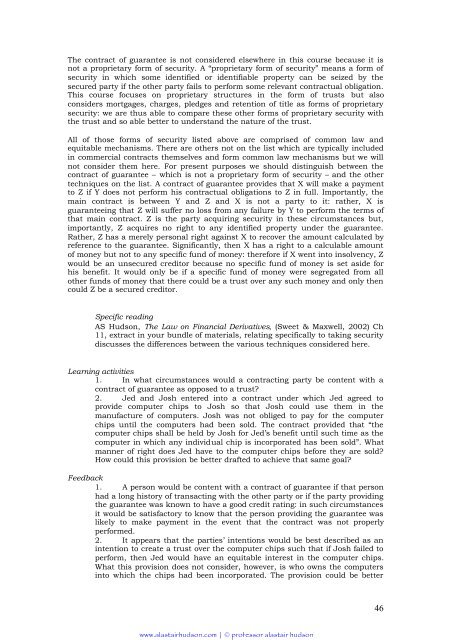Advanced Equity and Trusts Law - alastairhudson.com
Advanced Equity and Trusts Law - alastairhudson.com
Advanced Equity and Trusts Law - alastairhudson.com
You also want an ePaper? Increase the reach of your titles
YUMPU automatically turns print PDFs into web optimized ePapers that Google loves.
The contract of guarantee is not considered elsewhere in this course because it is<br />
not a proprietary form of security. A “proprietary form of security” means a form of<br />
security in which some identified or identifiable property can be seized by the<br />
secured party if the other party fails to perform some relevant contractual obligation.<br />
This course focuses on proprietary structures in the form of trusts but also<br />
considers mortgages, charges, pledges <strong>and</strong> retention of title as forms of proprietary<br />
security: we are thus able to <strong>com</strong>pare these other forms of proprietary security with<br />
the trust <strong>and</strong> so able better to underst<strong>and</strong> the nature of the trust.<br />
All of those forms of security listed above are <strong>com</strong>prised of <strong>com</strong>mon law <strong>and</strong><br />
equitable mechanisms. There are others not on the list which are typically included<br />
in <strong>com</strong>mercial contracts themselves <strong>and</strong> form <strong>com</strong>mon law mechanisms but we will<br />
not consider them here. For present purposes we should distinguish between the<br />
contract of guarantee – which is not a proprietary form of security – <strong>and</strong> the other<br />
techniques on the list. A contract of guarantee provides that X will make a payment<br />
to Z if Y does not perform his contractual obligations to Z in full. Importantly, the<br />
main contract is between Y <strong>and</strong> Z <strong>and</strong> X is not a party to it: rather, X is<br />
guaranteeing that Z will suffer no loss from any failure by Y to perform the terms of<br />
that main contract. Z is the party acquiring security in these circumstances but,<br />
importantly, Z acquires no right to any identified property under the guarantee.<br />
Rather, Z has a merely personal right against X to recover the amount calculated by<br />
reference to the guarantee. Significantly, then X has a right to a calculable amount<br />
of money but not to any specific fund of money: therefore if X went into insolvency, Z<br />
would be an unsecured creditor because no specific fund of money is set aside for<br />
his benefit. It would only be if a specific fund of money were segregated from all<br />
other funds of money that there could be a trust over any such money <strong>and</strong> only then<br />
could Z be a secured creditor.<br />
Specific reading<br />
AS Hudson, The <strong>Law</strong> on Financial Derivatives, (Sweet & Maxwell, 2002) Ch<br />
11, extract in your bundle of materials, relating specifically to taking security<br />
discusses the differences between the various techniques considered here.<br />
Learning activities<br />
1. In what circumstances would a contracting party be content with a<br />
contract of guarantee as opposed to a trust?<br />
2. Jed <strong>and</strong> Josh entered into a contract under which Jed agreed to<br />
provide <strong>com</strong>puter chips to Josh so that Josh could use them in the<br />
manufacture of <strong>com</strong>puters. Josh was not obliged to pay for the <strong>com</strong>puter<br />
chips until the <strong>com</strong>puters had been sold. The contract provided that “the<br />
<strong>com</strong>puter chips shall be held by Josh for Jed’s benefit until such time as the<br />
<strong>com</strong>puter in which any individual chip is incorporated has been sold”. What<br />
manner of right does Jed have to the <strong>com</strong>puter chips before they are sold?<br />
How could this provision be better drafted to achieve that same goal?<br />
Feedback<br />
1. A person would be content with a contract of guarantee if that person<br />
had a long history of transacting with the other party or if the party providing<br />
the guarantee was known to have a good credit rating: in such circumstances<br />
it would be satisfactory to know that the person providing the guarantee was<br />
likely to make payment in the event that the contract was not properly<br />
performed.<br />
2. It appears that the parties’ intentions would be best described as an<br />
intention to create a trust over the <strong>com</strong>puter chips such that if Josh failed to<br />
perform, then Jed would have an equitable interest in the <strong>com</strong>puter chips.<br />
What this provision does not consider, however, is who owns the <strong>com</strong>puters<br />
into which the chips had been incorporated. The provision could be better<br />
www.<strong>alastairhudson</strong>.<strong>com</strong> | © professor alastair hudson<br />
46













